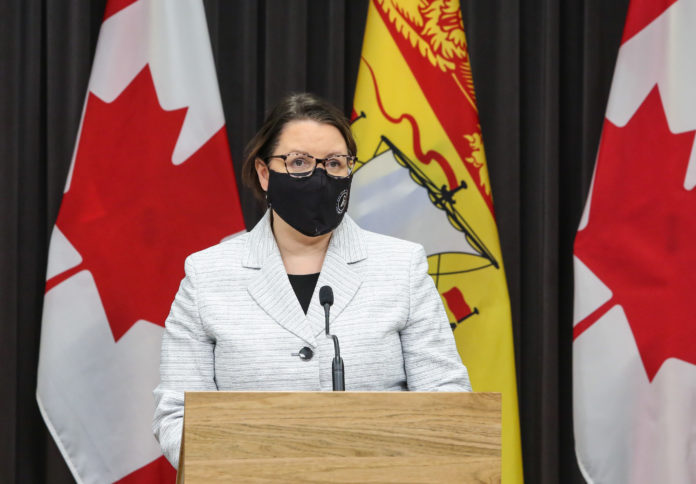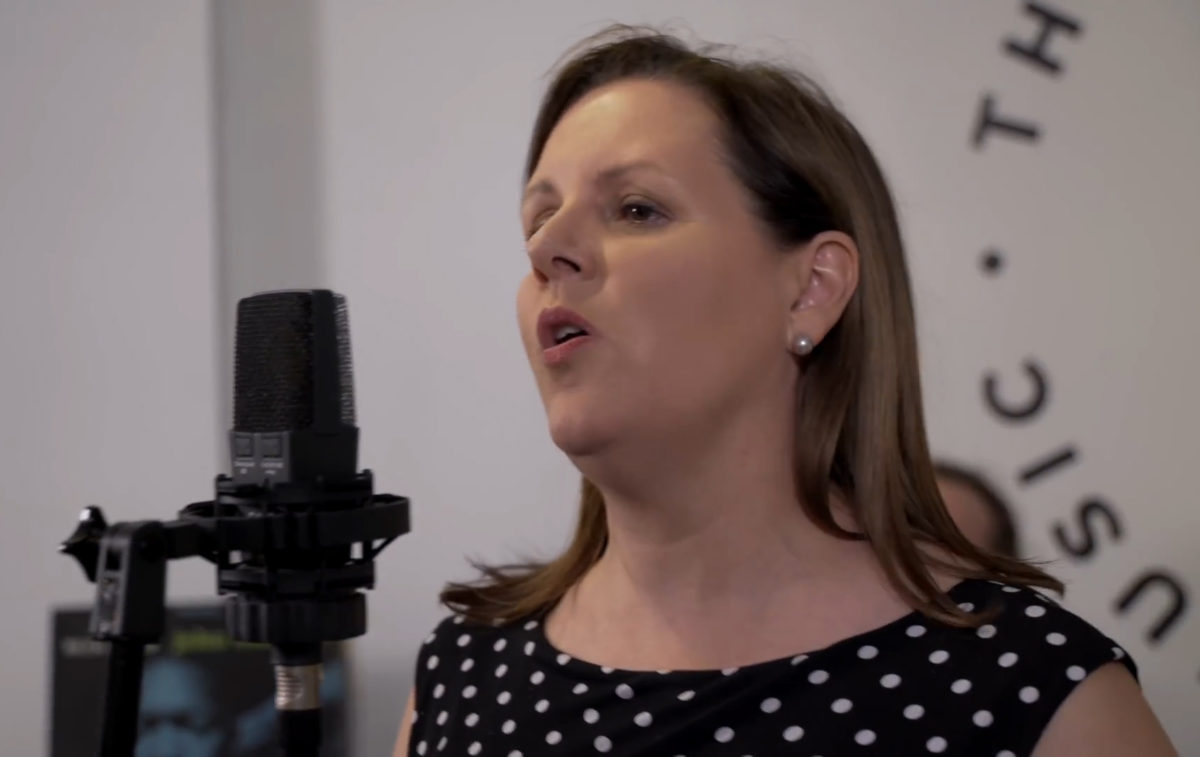
As blowing snow ravages outside, Dr. Jennifer Russell, New Brunswick’s chief medical officer of health, sits in a small government office wearing a black turtleneck, a fuchsia pink blazer and a string of pearls. An assistant helps rotate her phone to the correct angle.
For a little less than a year, Russell has been at the forefront of New Brunswick’s COVID-19 response. She has been a stern yet comforting voice at daily press conferences with Premier Blaine Higgs, updating residents about the virus’s impact.
“Sometimes it feels surreal,” said Russell. “It is incredible in terms of how far we’ve come and what we’ve accomplished and what we’ve learned, but sometimes it still is incredible to think, ‘wow, we are actually in a pandemic, it is still happening.’”
Ever since New Brunswick’s first presumptive case of COVID-19 in March 2020, Russell has provided outreach and other support to provincial health zones.
Russell said the province has gone through a learning experience when different zones experience case spikes, while others had very few. There seemed to be a switch when larger regions began seeing increases in positive test results for COVID-19, she said.
“It hit home in a different way,” she said.
The start of the pandemic
Early on in the pandemic, Russell’s workday started at 7:15 a.m., working 15-hour shifts until 10 p.m. seven days a week. As the pandemic’s effect on the province started to ease off around late spring and early summer, she returned to more “normal” hours, working from 8 a.m. to 5 p.m.
“[It] felt like a vacation,” said Russell. “I was starting to be able to take weekends off over the summer. Not entirely, because we were still doing some planning. Then in the fall, things picked up again.”
Depending on which phase the province is under, Russell said her workday typically revolves around a lot of meetings, with many taking place in-person or through software like Zoom. This often includes the New Brunswick Department of Health in-brief and out-brief, a set of meetings at 9 a.m. and 4 p.m. outlining the tasks that need to be done on a particular day.
Russell said during those meetings, which only take place when situations are “really intense,” Public Health connects with its provincial partners, including Ambulance New Brunswick, Extramural, the Department of Social Development and the Department of Education and Early Childhood Development.
One of the main challenges, Russell said, especially when holding a COVID-19 press conference, is trying to present new and evolving information in a way that can “best change [residents’] own behaviours and actions and their understanding of the risks.”
“I think that’s the thing that’s been probably the hardest for people, is how frequently things change,” said Russell. “I think everybody who’s been involved in the pandemic, from an evidence and science and research perspective, have seen things evolve.”
The COVID-19 pandemic weighed heavily on the mental health of New Brunswickers and Russell is no exception. There are a lot of things, she said, that can’t be controlled with the pandemic. But she said being thankful for what she does have has been helpful to her.
Russell said she also tries to fit in some “me time” to disconnect for an hour or two. Her go-to activities involve watching a movie, reading a book, playing music on her piano and saxophone or joining her children — Zachary, 17, and Olivia, 15 — and her partner, Lincoln, in the hot tub.
Being a mother and chief medical officer of health
While working a full-time job as New Brunswick’s top doctor, Russell has to work many hours as a full-time mother, too. Doing both during a pandemic, she said, hasn’t been easy since different recovery phases equal many changes to her children’s active lifestyles.
Since September, Russell said going to school every other day has been a challenge on top of their other worries and concerns, such as school work, friends and extracurricular activities. When days get busy, she tries her best to be there.
“Sometimes, it’s just a matter of being there for support and just being a mom, not chief medical officer of health, but just being mom and giving lots of hugs.”
Russell gained an interest in science, biology and medicine at a young age. It started with her brother, Jamie, who had multiple medical conditions. She spent a lot of time in and out of hospitals with him.
It wasn’t until she met her ex-husband, Randy Russell, while he was in medical school that she pursued a science degree from the University of New Brunswick. Before that, she obtained a Bachelor of Arts degree in music from Dalhousie University.
“When I was growing up, I definitely felt like I wanted to do something in the sciences, but I loved art so much, it was always hard to choose,” said Russell. “I think the best of both worlds is that I do have my music as a hobby.”
After graduating from UNB, Russell pursued medicine at Memorial University of Newfoundland and joined the Canadian Forces in her second year. She sees her time in the military as “valuable,” as it helped prepare her for her current role in Public Health.

When she isn’t delivering the latest set of COVID-19 cases, Russell is known around the Fredericton music scene through her appearances with the Jenn Russell Band, an ensemble that specializes in music from the swing era.
She started taking piano lessons when she was a child and took up the saxophone in junior high school. Russell sang in local choirs for most of her life and once she began studying at Dalhousie, she played with several jazz and concert bands.
“There’s just always something very positive and uplifting about music that has fulfilled a part of me for my whole life.”
After she started playing with a Fredericton cover band, Russell was inspired to write her own music, emulating big band style jazz from the 1940s. She has since released two CDs, with her most recent being in 2019 as a fundraiser for Liberty Lane.
“I listen to a lot of music every day. My partner and I are both musical. He plays sax and piano, [too], so we take turns, kind of playing with each other and for each other,” said Russell, adding her daughter sings, plays piano, ukulele and guitar. Her son plays piano and clarinet.
While she doesn’t have any plans for musical performances, Russell said her daughter told her to launch another CD.
“It takes me almost five years to do a CD, so perhaps at some point, I will get back to writing and doing some of that, but probably not in the short term,” said Russell. “But I could probably be inspired by some of the situations during the pandemic for sure to write some more.”
Russell said it can be discouraging when “crappy things” happen, but waiting for problems to get better helps to keep her in a positive state of mind. She said the pandemic has allowed her to challenge herself by drinking more water. At the end of tough days, she will drink tea in the evenings to stay calm and relaxed.
“It is easy to get drawn into the negative depending on where you’re looking and your information and stimulation,” said Russell. “I do try to have things in my Facebook feed and my Twitter feed that are very positive and motivating, just to try to nourish and nurture myself with those kinds of messages.”
